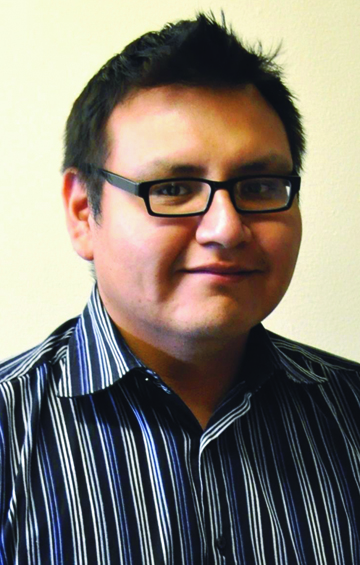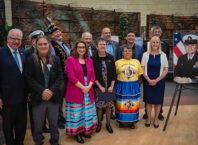 Walking Bull joins The Circle staff
Walking Bull joins The Circle staff
The Circle has hired a new Managing Editor. Alfred Walking Bull will start work July 1st and undergo a two month training period while he learns all aspects of running the monthly newspaper. Walking Bull comes from the Rosebud Sioux Tribe in South Dakota where he was the editor of the tribal newspaper, the Sicangu Eyapaha. Before that he was the Communications Consultant for the Native Youth Leadership Alliance, and a Field Organizer for the South Dakota Democratic Party. He also worked for the Argus Leader and for the Aberdeen American News. He attended the University of South Dakota. Walking Bull takes over the newspaper operations from long-time editor Cat Whipple who is stepping down after 13 years. Her last day will be August 31st.
New Grant Fund Advances Native Organizing and Advocacy
Native Americans in Philanthropy (NAP) and Common Counsel Foundation (CCF) announce the launch of Native Voices Rising (NVR), a research and re-granting project designed to support grassroots groups led by and for Native communities in American Indian, Alaska Native, and Native Hawaiian communities. Native Voices Rising establishes a mechanism for donors to invest in organizations led by Native people through a grantmaking vehicle whose decision makers are also members of Native communities. NVR funding is informed by its newly released report “A Case For Funding Native-Led Change,” which identified 146 non-profit social change organizations led by Native Americans to benefit Native communities. The report includes in-depth surveys with 49 of these organizations. “This innovative project uniquely fills knowledge gaps within the philanthropic sector regarding the needs of Native communities and the strategies these communities employ to create change,” noted Native Americans in Philanthropy’s Executive Director, Carly Hare. The researchers identified five issue areas in which Native community groups are most active: environmental justice; subsistence in Alaska; Native engagement in the urban context; media; and voter engagement. “With only .3% of charitable funding dedicated to Native causes, as reported by the Foundation Center,” remarked Laura Livoti, CEO of Common Counsel Foundation, “we hope Native Voices Rising will catalyze increased support for this under-resourced community over the next decade.” Native Voices Rising is a funding vehicle that will utilize Native-led grantmaking committees, composed of Native leaders and supported with staff expertise provided by the Common Counsel Foundation and Native Americans in Philanthropy. The first NVR grants will be disbursed in December 2013, with support from Open Society Foundations. Interested organizations are encouraged to apply at www.NativeVoicesRising.org. Letters of Intent are due August 15, 2013. Interested donors are encouraged to contact Common Counsel Foundation to learn more about contributing to the re-granting pool. The full report or an executive summary can be found on Native Voices Rising website, www.NativeVoicesRising.org
Shakopee Mdewakanton Sioux Community donates bees, hives
The green roof at the Minneapolis City Hall and Courthouse building is now buzzing with honeybees, thanks to a donation from the Shakopee Mdewakanton Sioux Community, which donated the bees from its own apiaries. Bees on rooftops are common in cities, and the green roof provides critical, protected habitat – especially in a commercial area such as Downtown. The two hives are expected to grow to about 50,000 bees each. The Shakopee Mdewakanton Sioux Community donated the bees and equipment as part of its commitment to a sustainable environment and to help the City with its environmental goals. The Shakopee Mdewakanton Sioux Community’s own beehives have brought benefits including pollination of the fruits and vegetables at the tribe’s Wozupi (garden), honey production, and increased public awareness of the importance of pollinators through Wozupi classes and tours. The beehive installation promotes awareness of urban ecosystems and furthers City goals including locally grown food available and chosen; and livable communities, healthy lives. It is also intended to serve as an example of urban and rooftop beekeeping since the City recently relaxed its beekeeping rules for rooftop hives. Other donors to this rooftop honeybee project include the Crystal VFW, Kingfield Neighborhood Association, Michelle Borland, Kelly Hamm, Ed Hanlon, John Prest, Leane Slominski, Joyce Thomas and Kristin Troutwine. These donations are for supplies and additional equipment






